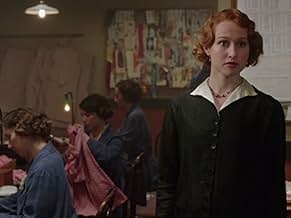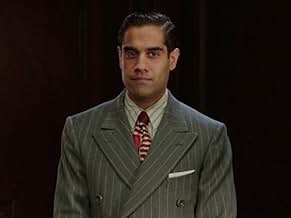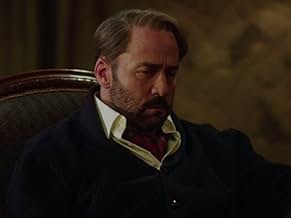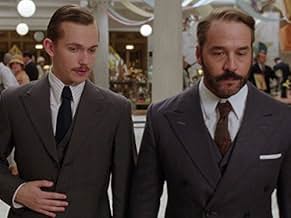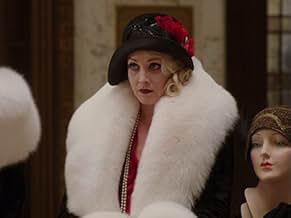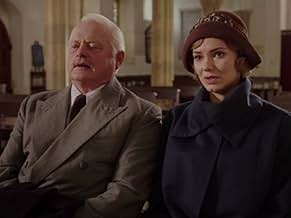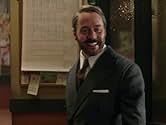Se centra en la historia real del extravagante y visionario fundador estadounidense de Selfridges, los grandes almacenes de Londres.Se centra en la historia real del extravagante y visionario fundador estadounidense de Selfridges, los grandes almacenes de Londres.Se centra en la historia real del extravagante y visionario fundador estadounidense de Selfridges, los grandes almacenes de Londres.
- Nominado para 1 premio Primetime Emmy
- 1 nominación en total
Explorar episodios
Argumento
¿Sabías que...?
- CuriosidadesWhen Rose Selfridge meets Roderick Temple at the National Gallery, she fibs and tells him her last name is Buckingham. In fact, the real Rosalie Selfridge was named Buckingham before her marriage to Harry Gordon Selfridge. The Buckingham family was very prominent in Rosalie's native Chicago, and relatives of Rosalie gave the funds for the enormous Buckingham Fountain in Grant Park, which is still one of Chicago's best-known public landmarks.
- ConexionesFeatured in The Wright Stuff: Episodio #18.5 (2013)
Reseña destacada
'Mr Selfridge' (PBS)
The great American playwright Neil Simon, in his memoir "Rewrites," recalls that he was on the brink of "replacing" the late actor Jerry Orbach in the Broadway musical "Promises, Promises," when suddenly, Orbach seemed to pull a performing rabbit out of the hat and became absolutely brilliant in the part. The show, an adaptation of the 1960 Oscar-winning film, "The Apartment," had 1,281 performances from December of 1968 to January of 1972, and Orbach won the Tony Award as Best Actor for his performance. I was reminded of this as I watched Jeremy Piven in the title role of the PBS drama series, "Mr Selfridge," which has just begun its second season. The series, a British period piece about Henry Gordon Selfridge, the American who came to London and opened his department store, Selfridge & Co., at the beginning of the 20th century, has clearly been a class production since the moment it premiered (January 6, 2013 in the United Kingdom and March 30, 2013 in the United States). What I was less certain about was Piven. He didn't, at first, seem up to the task of matching stride for stride a cast that was chock-full of fine British actors. My suspicion is that he himself was questioning his abilities. But he had his moments, enough to have hope for him in the second season. He's now proved, as the next go-round gets underway, that like Orbach, he possesses a deep reservoir of talent that has allowed him to pull the performing rabbit out of the hat, doing not only a capable job, but an outstanding one, certainly worthy of consideration when awards season rolls around. Like the Selfridge character itself, a man who matured and evolved from a philandering husband and mercurial businessman to a steady spouse and solid leader, Piven also has grown, delving into the many sides of a truly prismatic man, as complex as he was brilliant, with a sure hand that reveals an actor who knows what he is doing and mesmerizes in the process. The series itself is knee-deep in colorful quality, depicting the landmark Selfridge department store and the period in which it was born with a brilliance that both captivates and explains. The supporting cast is superb _ Frances O'Connor as Selfridge's beleaguered wife, Rose, Aisling Loftus as the blossoming young woman and retail whiz Agnes Tower, Gregory Fitoussi as Selfridge's best friend and business confidant Henri Leclair, Amanda Abbington as the emotionally fragile sales head Miss Mardle (it's nearly impossible to imagine Abbington as the icy, assured Mary Morstan that she so effectively portrays in the BBC's hit series, "Sherlock"), Tom Goodman-Hill as the sad personnel head Mr. Grove, Ron Cook as the ever-dependable right hand man Mr. Crabb, and on an on. But without an effective Piven as Selfridge, the foundation of this universe would crumble. Especially now. The plot is beginning to thicken, as they say, with World War I on the horizon. Complex issues, plots and characters obviously await. It's clear that Piven, as Orbach did decades ago on Broadway, has found his sweet spot with his character. And as with "Promises, Promises," the sky's the limit for "Mr Selfridge."
The great American playwright Neil Simon, in his memoir "Rewrites," recalls that he was on the brink of "replacing" the late actor Jerry Orbach in the Broadway musical "Promises, Promises," when suddenly, Orbach seemed to pull a performing rabbit out of the hat and became absolutely brilliant in the part. The show, an adaptation of the 1960 Oscar-winning film, "The Apartment," had 1,281 performances from December of 1968 to January of 1972, and Orbach won the Tony Award as Best Actor for his performance. I was reminded of this as I watched Jeremy Piven in the title role of the PBS drama series, "Mr Selfridge," which has just begun its second season. The series, a British period piece about Henry Gordon Selfridge, the American who came to London and opened his department store, Selfridge & Co., at the beginning of the 20th century, has clearly been a class production since the moment it premiered (January 6, 2013 in the United Kingdom and March 30, 2013 in the United States). What I was less certain about was Piven. He didn't, at first, seem up to the task of matching stride for stride a cast that was chock-full of fine British actors. My suspicion is that he himself was questioning his abilities. But he had his moments, enough to have hope for him in the second season. He's now proved, as the next go-round gets underway, that like Orbach, he possesses a deep reservoir of talent that has allowed him to pull the performing rabbit out of the hat, doing not only a capable job, but an outstanding one, certainly worthy of consideration when awards season rolls around. Like the Selfridge character itself, a man who matured and evolved from a philandering husband and mercurial businessman to a steady spouse and solid leader, Piven also has grown, delving into the many sides of a truly prismatic man, as complex as he was brilliant, with a sure hand that reveals an actor who knows what he is doing and mesmerizes in the process. The series itself is knee-deep in colorful quality, depicting the landmark Selfridge department store and the period in which it was born with a brilliance that both captivates and explains. The supporting cast is superb _ Frances O'Connor as Selfridge's beleaguered wife, Rose, Aisling Loftus as the blossoming young woman and retail whiz Agnes Tower, Gregory Fitoussi as Selfridge's best friend and business confidant Henri Leclair, Amanda Abbington as the emotionally fragile sales head Miss Mardle (it's nearly impossible to imagine Abbington as the icy, assured Mary Morstan that she so effectively portrays in the BBC's hit series, "Sherlock"), Tom Goodman-Hill as the sad personnel head Mr. Grove, Ron Cook as the ever-dependable right hand man Mr. Crabb, and on an on. But without an effective Piven as Selfridge, the foundation of this universe would crumble. Especially now. The plot is beginning to thicken, as they say, with World War I on the horizon. Complex issues, plots and characters obviously await. It's clear that Piven, as Orbach did decades ago on Broadway, has found his sweet spot with his character. And as with "Promises, Promises," the sky's the limit for "Mr Selfridge."
- kckidjoseph-1
- 7 abr 2014
- Enlace permanente
Selecciones populares
Inicia sesión para calificar y añadir a tu lista para recibir recomendaciones personalizadas
- How many seasons does Mr Selfridge have?Con tecnología de Alexa
Detalles
Contribuir a esta página
Sugerir un cambio o añadir el contenido que falta

Principal laguna de datos
What is the Japanese language plot outline for Mr. Selfridge (2013)?
Responde





